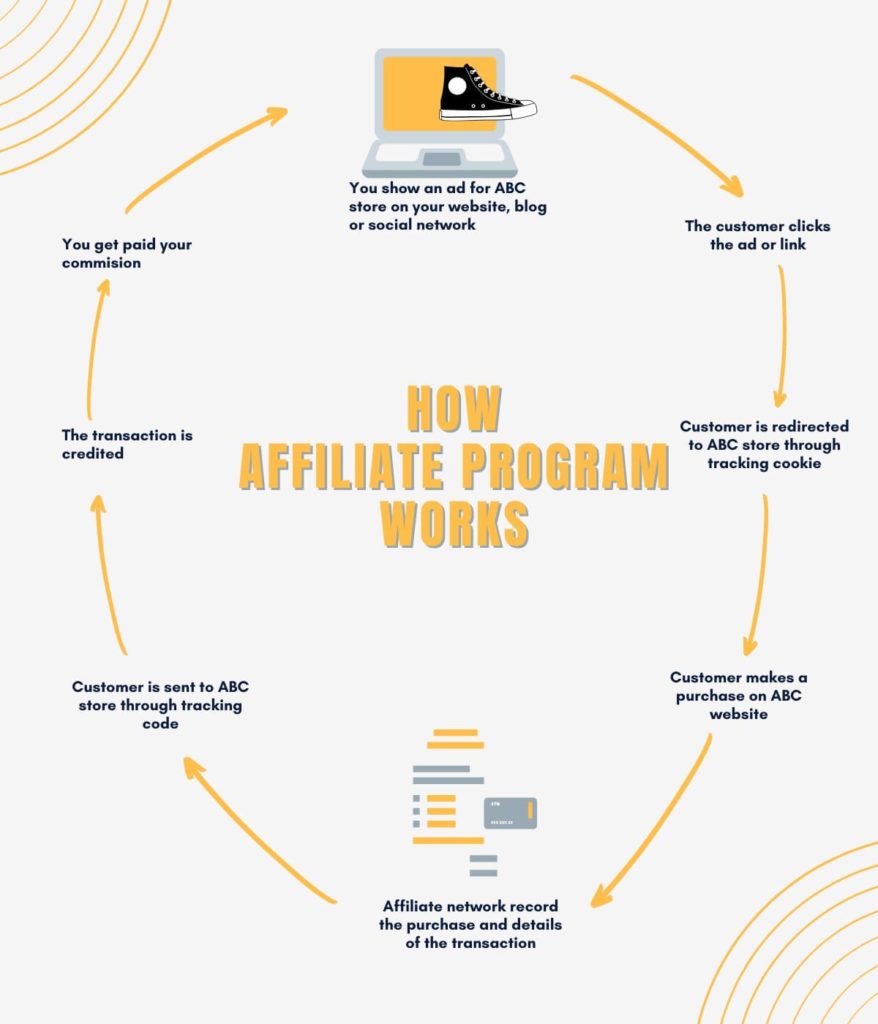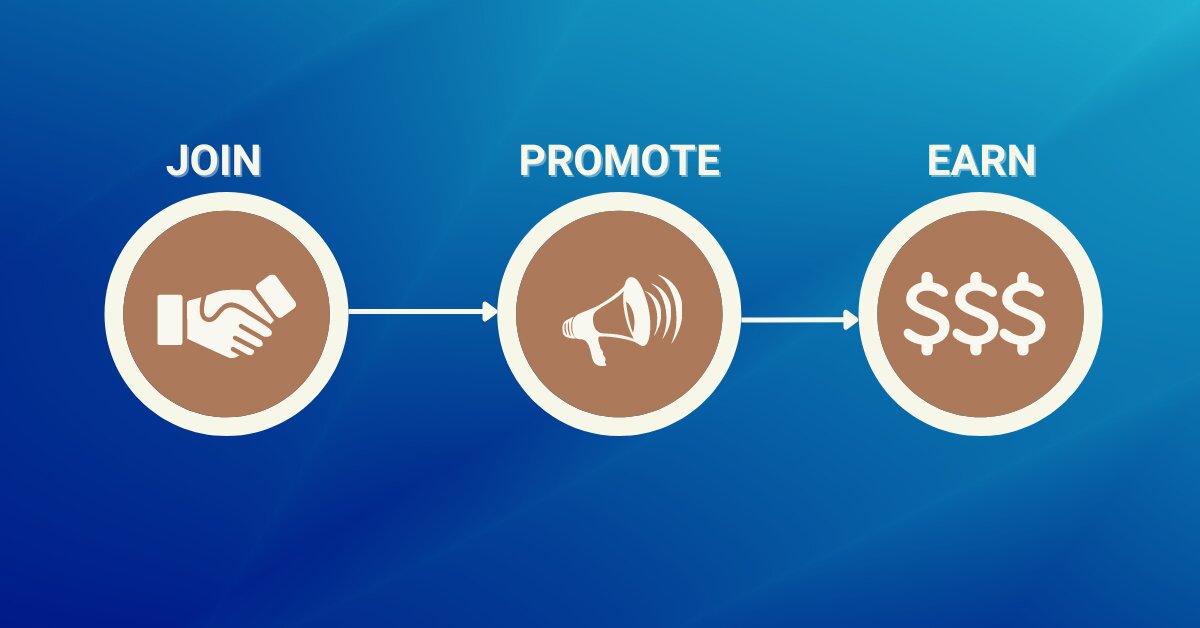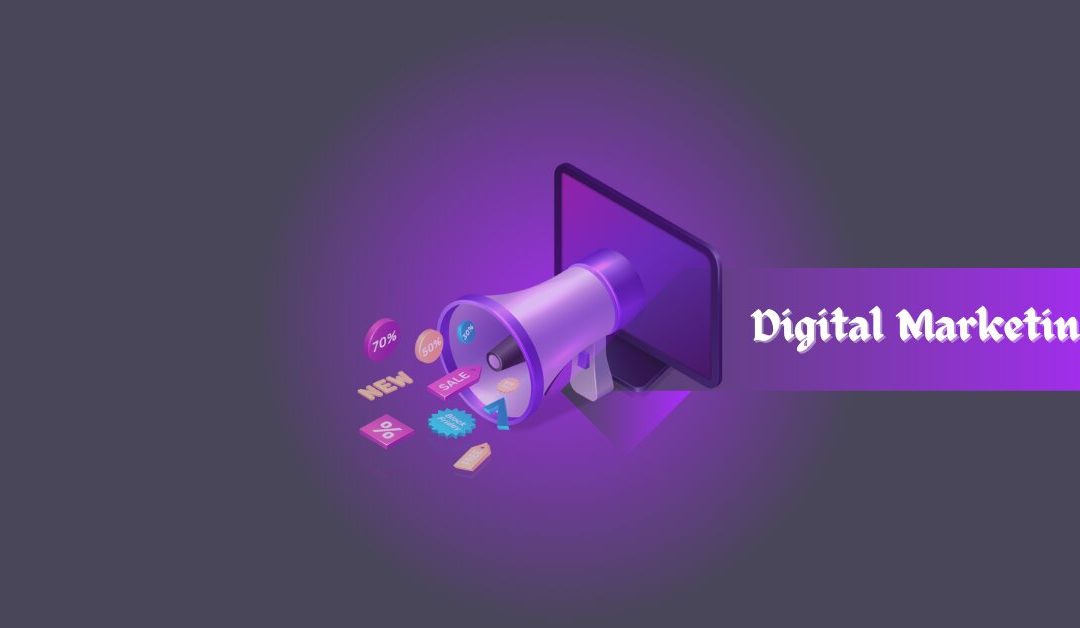Affiliate marketing: Ever heard the word and asked what is affiliate marketing and how does work? Affiliate marketing has become one of the most popular ways to earn an income online, and there are plenty of reasons for this. You don’t need your product or service, you can set your hours, and it’s easy to get started if you know where to look. If you’re curious about how affiliate marketing works, keep reading! I’ll walk you through the different kinds of affiliate programs out there and how to find the ones that will work best for you!
Table of Contents
What is Affiliate Marketing?
Affiliate marketing is a performance-based marketing strategy in which a business rewards one or more affiliates for each visitor or customer brought by their marketing efforts. This process may be accomplished by a link containing an affiliate tracking code assigned to a certain page, product, campaign, advertiser, or service. When someone clicks on that link, purchases are made from that person’s account. The reward can be a percentage of sales/purchases (commonly known as performance-based) or a set fee per lead (commonly known as cost per action).
Affiliate marketing means you earn a commission by promoting someone else’s (or company’s) products. In other words, you get paid for referring customers who purchase a product or service. Unlike traditional advertising, where you pay for clicks or impressions, there are no upfront costs in affiliate marketing. You only get paid when someone completes an action (signs up, buys something, etc.). The above process makes affiliate marketing an attractive option for building a sustainable online business.
In affiliate marketing, your audience is essentially anyone who has a platform from which they can market your product for you. If you think about it, there are only two groups of people you need to do so—bloggers and content creators. Share on XIn some cases, there is no limit to how much you can earn with affiliate marketing; however, based on report by Influencer Marketing Hub an average marketers makes around around $50,000 per year. Some programs payout commissions regardless of whether people buy anything or not, while others only payout if they purchase through your links! These types of rules vary greatly between different affiliate programs.

To get started, you can create your website or blog where you will be promoting products relevant to your niche as an affiliate marketer. Or promote your affiliate products on platforms like social media, email campaigns, coupon sites, and other digital channel. Promoting your affiliate marketing channels will enable you to attract visitors interested in your niche but may not know about affiliate marketing yet. If your visitors like what they see on your site or social media handle, there is a chance that they might click on one of your links which could result in them purchasing something from one of your merchant partners!
What Makes Affiliate Marketing System
There are a series of steps, programs, and people involved for affiliate marketing to work, and these include merchants, affiliate marketers, consumers (people), and the affiliate network. I will each of them one by one and what they do in the system.
The Merchant
A merchant sells goods or services; in affiliate marketing, the merchant is the owner of the product or brand, and the merchant is the seller of the product or creator of the service. Typically, you’ll find merchants in retail stores, restaurants, and other local businesses, though online merchants are becoming more common thanks to affiliate marketing. The merchant can be a company or an individual who sells products or services online.
Merchants often work with affiliate marketers, who generate leads by advertising their products or services on blogs or websites. Once a consumer responds to an advertisement, they are sent directly to a merchant website (either through clicking on an email link or through another website) where they can make a purchase. If that consumer makes a purchase, the affiliate marketer receives compensation from that merchant. The amount of compensation varies depending on several factors, including how much money was spent by the customer and what kind of product was purchased.
The Affiliate Marketers
An affiliate marketer is an individual or company representing an organization that sells goods or services. As an affiliate marketer, you don’t sell your products; instead, you link to products on your website and get paid a commission when someone buys something due to your recommendation. If you want to promote a company or product on your blog, it’s called being an affiliate for that particular product or business.
Affiliate marketers make marketing happen by promoting one or multiple of their affiliate products, systematically attracting and convincing their followers of the value the merchant’s products will add to their lives or business. Their followers can end up buying them.
Most affiliate marketers promote affiliate products by running a review of the merchant products on their blogs like the one below:

While some marketers dedicate their entire website to promoting some products and services, they feel their users will find them very interesting and useful.
(Discounthubs.net is one of the websites that dedicates the entire website to promoting affiliate products)

It’s important to note that affiliate marketing isn’t only about making money off sales; plenty of non-monetary benefits are associated with having more people visit your site. For example, affiliate links allow you to earn extra income without creating new content, which means you can spend more time working on other aspects of your business. In addition, affiliates often receive free samples and other perks from companies in exchange for their reviews—and since they already use and love those products, they’re likely to talk about them positively!
The Consumer
The consumer is someone who needs or wants goods or services. Affiliate marketing relies on consumers to buy products or use services for affiliate marketers to earn commissions and merchants to make sales. The more consumers that purchase products from a business using an affiliate link, the more sales such business will make and the more commission the affiliate marketers will earn.
Purchasing products through affiliate links creates revenue for merchants and benefits them by allowing them to grow larger. Consumers are important because they keep companies going. Without consumers, there would be no need for affiliate marketing; they are the heartbeat of affiliate marketing. Consumers make it easy for the merchant to have resources (money) to share with the affiliate marketers as commission for their marketing efforts. Consumers are the reason why affiliate marketers make money online.
The Affiliate Network
The affiliate network serves as a middle man between the merchant and the affiliate marketers. The first step in affiliate marketing is joining an affiliate network. There are hundreds of affiliate networks, such as, Impact, CJ Affiliate, ShareASale, ClickBank, and FlexOffers. These networks provide affiliates with access to multiple companies and products. In turn, affiliates can reach potential customers by promoting one company or product at a time. Once you sign up for an affiliate network, you will receive your unique affiliate link. To make money with that link, you must convince people to click on it. Now that you understand what makes an affiliate marketing system works let’s move to how affiliate marketing works.
How Affiliate Marketing Works
It may seem tricky at first, but affiliate marketing is quite simple. An affiliate marketer earns a commission by selling other companies’ products through their website or social media pages. When done properly, it’s a valuable tool for both companies and marketers. Businesses gain more exposure for their products, and affiliate marketers make money in addition to what they can make from product sales alone.

Affiliate marketing involves selling other’s people products or services by sharing them or writing reviews about the product on a blog, podcast, social network, website, or any other digital platform. The affiliate network can easily track each transaction that comes from you since affiliate marketing is performance-based marketing where a business rewards one or more affiliates for each visitor or customer brought by the affiliate’s marketing efforts.
Businesses pay their affiliates when those visitors purchase goods or services through links provided on their websites, blogs, social media pages, email campaigns (newsletters) etc. – Earnings are paid in commission and tracking links. There are many ways to earn money with affiliate marketing, such as CPA (cost per action), CPL (cost per lead), CPC (cost per click), CPI (cost per install), and CPS (cost per sale).
The affiliate earns a commission each time someone purchases through the unique link associated with their recommendation. When someone clicks on your affiliate link and makes a purchase, they are technically buying from you, even though they aren’t aware. Your affiliate link is tied to you, whether you made all of the sales directly or not.
Types of Affiliate Marketing
We have three main types of affiliate marketing: unattached affiliate marketing, related affiliate marketing, and involved affiliate marketing.
- Unattached Affiliate Marketing
This type of affiliate marketing is pay-per-click affiliate marketing, which means the affiliate doesn’t have any known connection to the promoted product or services. There is no connection between the affiliate marketer and the customer. Most of the time, the affiliate runs pay-per-click campaigns with their affiliate link hoping people will click it, buy the product, and earn a commission. There’s no familiarity whatsoever between the affiliates and the consumers; the affiliate only places the products or services links in front of someone via Google Adwords, Facebook ads, and any other ads network. With the hope that someone will click the link to buy the product or use the service to earn a commission.
- Related Affiliate Marketing
This type of affiliate marketing is where there is little attachment between the affiliate and the products. The attachment is that the affiliate marketer may not have used the product before. Still, the product is related to the affiliate’s niche. Related affiliate marketing is when an affiliate marketer promotes products and services related to their niche even though the affiliate never claims to use the product or service.
Related marketing happens when the affiliates have built trusted followers over time through blogging, YouTube channel, or any other social network; the affiliates’ influence makes the audience trust their recommendation of any products and services. The only connection in related affiliate marketing is between the affiliate’s niche and the product or service; aside from these, nothing else. The affiliate has a community of loyal followers, which gives enough traffic and influence and makes them experts in the chosen niche, making the website followers trust the judgment to purchase the products or use the services.
The only problem with related affiliate marketing is that it can dent the reputation of the affiliate marketers; building a good reputation online is not easy, and promoting products you have never used to your trusted followers could dent the reputation you have built over time because the product or service you recommend without using could be a bad product than you can imagine.
- Involved Affiliate Marketing
This type of affiliate marketing establishes a deeper connection between the affiliate marketers and the product or service they are promoting. In this kind of affiliate marketing, the affiliate marketers have used a product or service before recommending it to their followers. The products or services are tested and trusted by the affiliate marketers, and they are certain that the products or services will benefit and enhances their audiences’ workflow or productivity. A typical example is my sincere review of a cloud-based anti-spam plugin for WordPress on my site.

This type of affiliate marketing is the best because you only recommend products and services you have used and are certain of. You used the product first and find it helpful, and then you write a review on your blog post or social media pages with your affiliate link attached to make money. Involved affiliate marketing is a good business model where you trust a product and recommend it with all honesty for your audience to enjoy. At the same time, you earn a commission for your recommendation.
Pros and Cons of Affiliate Marketing
You need to understand some pros and cons of affiliate marketing before jumping in first. You should know your goals and whether affiliate marketing can help you achieve them. If not, perhaps another form of online marketing would suit your needs.
Pros
Aside from not having to pay taxes on your earnings, affiliate marketing has many pros, but here are a few of them.
Passive Income
One of the best things about affiliate marketing is that it allows you to earn a passive income while doing whatever you want. Affiliate marketing allows you to make a stream of income generated by your marketing effort when people make a purchase using your affiliate links. This income may come from the three types of affiliate marketing mentioned above.
Low Risk
Affiliate marketing requires no central office or storefront, and you can stay anywhere in the world and run your business. You don’t need any initial capital to start affiliate marketing; you can start making money right away without fear of losing any investing capital. All you need is traffic and trusted audiences that will buy the products so that you earn your commissions.
Easy to Scale
Another benefit is that it doesn’t require any employees besides you; it can be run by one person and one computer or smartphone.
You can scale your earnings without hiring an extra hand. All you need is to write a captivating review on your blog post or social media handles to introduce products to your audience; once they buy, you make your money even in your sleep.
Cons
Affiliate marketing isn’t all sunshine and roses. There are several disadvantages, too; let’s identify some of the challenges of affiliate marketing.
Limited Income
Since affiliate marketing is commission-based marketing, most affiliate marketers don’t make enough money to sustain themselves; there is no boss to pay and no brand support. You work alone, and if you don’t have enough sales, you make little money.
No control over Inventory
You don’t have control over Inventory or pricing on products sold through affiliate links; you can lose money if products are returned, or there is some error in your link.
No Control over Program
Every affiliate program has laid down rules that each affiliate marketer must follow. They present you with the guidelines on how to market the products; otherwise, you can be blocked from using the program.
How do Affiliate Marketers make Money?
The amount of money a marketer makes in affiliate marketing depends on the number of audiences or followers an affiliate has. Some marketers only make a few bucks per month, while we have some affiliate marketers like Ryan Robinson, who makes more than $17,000 per month through affiliate marketing alone. To make huge money through affiliate marketing, you need to build a large crowd of followers and earn their trust.
There are several ways that affiliates make money in affiliate marketing. One of the ways is when a visitor clicks on an affiliate link and purchases a product or service. Another is contextual advertising, which occurs when advertisers allow affiliates to place their ad copy on their site as a third-party endorsement. The affiliate marketer also makes money by creating custom landing pages for products or services with unique and captivating content around the products they recommend.
It’s also worth noting that many affiliate programs offer recurring commissions. In other words, if you refer someone to a product and they purchase it while signed up under your affiliate tracking code, you will receive commissions as long as the customer keep using the product. Suppose you refer someone to a product, and the person purchases it while signing up under your referral code. In that case, you will receive recurring commissions as long as they remain customers of that particular brand/service. That’s what makes affiliate marketing so powerful! Now that you’ve known ways affiliates marketers make money, let’s look at how affiliate marketers get paid.
How Do Affiliate Marketers Get Paid?
Since affiliate marketing is the process of getting paid for referring customers who purchase a product or service, in affiliate marketing, you only need to link up sellers to the consumers for a commission, and there are no upfront costs; you only get paid when someone completes an action such as signing up, buying a product, etc. This benefit makes affiliate marketing an attractive option for building a sustainable online business. But the question is, how do affiliates get paid?
When affiliates choose products to promote, payment models differ from one company to another; each company comes with its payment model; once you read it, you understand what you need to do to get paid and the payment method. But regardless of which payment model they choose, here are common ways affiliate marketers get paid.
Pay Per Sale (PPS)
In this type of affiliate marketing payment method, the affiliate marketer gets a percentage of the price of the product purchased by the consumer from the merchant as a commission for the marketing effort. In other words, the affiliate gets a commission from each sale that occurs through his marketing effort. This type of payment payout is common in e-commerce. When a visitor clicks on one of your affiliate links and purchases within a set period, you earn a commission based on how much was spent. For example, if someone buys a $100 product through your link, you’ll make $10 if the commission percentage is 10%.
- Pay Per Lead (PPL)
This type of payout method in affiliate marketing compensates the affiliate based on the leads generated. Pay per lead programs give you a commission for every lead that comes in from your site—regardless of whether or not they buy anything—and typically have higher payout rates than pay per click programs do. This type of payout method is very easy for affiliate marketing beginners to do because it is easier to convert leads than to convince the consumers to buy products. The only downside of this type of affiliate is that since leads can be generated by anyone who visits your site, there’s no guarantee that they will convert into customers.
- Pay Per Click (PPC)
Big corporations and organizations use this type of payout model to build brand awareness online; it drives traffic to the merchant’s website. The affiliate gets paid in this kind of payout model by encouraging their audience to visit the merchant’s website; once the affiliate marketer redirects consumers from their website or social media handles to the merchant’s website, the affiliate gets paid. You get paid based on the number of traffic you drive to the merchant’s website.
- Pay Per View (PPV)
The pay-per-view payout model may work similarly to pay-per-lead, except you earn a commission only when visitors view a particular page on the merchant’s website—not just an any-how page but related to an advertiser’s product or service. So if you place an ad for a hotel chain on your travel site, and someone lands on their hotel page after clicking on your affiliate link, you earn money. But if they click through to another section of your site before viewing the hotel page, you won’t receive payment.
- Pay Per Action (PPA)
Pay-per-action (PPA) payout method allows advertisers to specify what action potential customers must take on a merchant’s website before an affiliate marketer can be eligible for affiliate commission. For example, an advertiser might require viewers to fill out a form with personal information or download a coupon before the affiliate can qualify for commission. The affiliate marketer gets a commission whenever they persuade consumers to perform certain actions on the merchant’s website, such as signing up, filling out a contact form, downloading files, or subscribing to a weekly newsletter.
Keep in mind that many affiliate networks don’t allow you to participate in pay per acquisition and pay per sale/lead simultaneously. Hence, it’s important to choose which type of program is right for you before signing up. Also, keep in mind that some companies use these terms interchangeably, while others may use different names.
Other common forms of affiliate marketing include Pay-per-download (PPD): Earn money when someone downloads a file from your site. Pay-per-impression (PPI): Earn money each time someone views an advertisement on your site. Pay-per-call: Earn money when people call phone numbers listed on your site or advertisements you display on other sites. Pay-per-email: Earn money when someone opens a message you’ve sent to them. Pay-per-video view: Make money each time a video on your site is viewed. Pay-per-form fills: Make money when a form on your site is filled out. Pay-per-app installs: Make money each time an app is installed on a mobile device. Pay-per-blog post read: Make money each time someone reads a post on your site.
How to Start Affiliate Marketing
It’s relatively easy to get started with affiliate marketing once you understand how it works. Affiliate marketing is a simple way to start an online business. Once you understand how it works, it’s fairly easy to get started. It takes some time and effort to learn how to succeed, just like every other business, but you can make a good living in affiliate marketing if you put in enough time and effort. It doesn’t take much time or money to start, but there are a few things you should consider before getting started. Here are the steps to follow to get started with affiliate marketing.
- Pick a Marketing Platform and Method
The first step is to diligently choose the marketing platform you wish to build your audience around; some popular marketing platforms for most affiliates include blogging, Facebook, YouTube, TikTok, Instagram, and Pinterest. Once you have chosen the platform(s) you understand and used most, determine the affiliate marketing ideas you need based on your marketing platform. Regarded of the platforms you choose, keep in mind that you need to be unique and original to build loyal audiences.
- Pick your Niche and Audience
The next step is to choose what niche you want to focus your affiliate marketing on. Some popular niches include blogging, travel, health & fitness, fashion & beauty, sports & outdoors, and pets. But before you choose a niche, remember to choose a niche you’re passionate and knowledgeable about, as this will make your audience sees you as authentic, unique, and a trusted source of information. It will also help you evaluate and promote products that will enhance the workflow and productivity of your followers.
Suppose you are passionate about pets and want to help other pet lovers and owners with information on how a pet should be trained and cared for. In that case, you can start a blog around pets where you will publish articles regularly and use a marketing strategy to promote your content to pets lovers (audiences) and encourage them to subscribe to your mailing list.
- Find Products or Brands to Promote
No matter the niches your content is all about, you can find products to promote, which makes it easier than ever to get started as an affiliate marketer. As with any business venture, though, you need a good product or service before you start promoting it. But the ideal thing is to promote products related to your niche, which will benefit your audiences’ needs. So if you’re a travel blogger, then promote products that will help people going on vacation enjoy their holidays; if you run a pet supply website, promote products that would be of interest to pet owners; and so on.
Just make sure to follow applicable laws and regulations for affiliates. Some industries require you to register with a network like Commission Junction before you can sell their products.
Once you’ve chosen an affiliate program for your company, it’s time to make a website or landing page. A landing page is a single-page website with a call-to-action button that will direct traffic to an offer or sign-up form.
Thinking of where to get products or brands to promote? Here are lists of some popular affiliate marketplaces.
You can also find affiliate programs related to your niche by typing some keywords into the Google search bar. For example, if you are a travel blogger, type (affiliate program + hotel) and see what comes up. You will get a list of hotels with an affiliate program you can sign-up for, and if any of your followers clicks the link to book for any of the hotels through your link, you get paid.

You can also reach out to the company you’ve used or come across their products to see if they offer an affiliate marketing program. If they don’t, they might come up with a special coupon code to share with your followers so that you can earn a commission.
- Choose your First Affiliate Program
Once you have chosen your marketing platform, niche(s), and products to promote, it’s time to find some affiliate programs related to your niche that offer high commissions and start promoting their products on your site! But ensure that the product is related to your niche and relevant to your target audience. You can ask yourself a few questions; will my target audience find these products valuable? Does this fit my niche and area of expertise?
For example, it doesn’t make sense for a finance blogger to promote health products when there are finance-related products like payment cards out there to be promoted. Another thing is that the product or service you’re promoting should fit the marketing platform you are using. For example, promoting software on Instagram won’t convert to promoting picture-related products like clothing because Instagram is a picture-centered social media. So, it would be best to let the product you’re promoting align with your marketing platform. Some products are good for blogging and YouTube alone, while other fits into Facebook and Twitter.
Common Type of Affiliate Marketing Channels
There are different affiliates marketing channels to get products across to consumers using the affiliate marketers. It depends on each affiliate to decide what method works well for them as products are not promoted the same way. Here are some of the affiliate marketing channels out there.
- Influencers
An influencer marketing channel is the process of brands using the power of an influencer who has, over time, systematically built a powerful and enthusiastic audience online to sell their product. This method involved using the power of an online influencer to affect consumers’ purchasing decisions because of the respect consumers has for the influencers. An influencer is an authority with enormous skills in their chosen niche and can easily impact the audience because they respect them.
This type of affiliate channel is commonly used on social media like Instagram, Facebook, Twitter, and LinkedIn. Brands partners with influencers to use their purchasing power to review their products and services to their loyal audience for a commission. The only cons in using this type of channel for the brand is that you can’t set rules or laws for the influencer because he has the audience, and their opinion counts to the audience alone. The audience listens to him and not your brand, so your brand can’t set business rules.
- Content Marketing Channels (Blogging)
This type of marketing channel entails using the service of experienced content writers and bloggers to craft compelling content around your products for a commission. The bloggers and content writers have their websites and blogs where they have invested in Search Engine Optimization (SEO) to rank organically on search engines to generate ROI. The blogger or content writer will come up with a mind-blowing positive review, including coupon codes to slash down the price of the merchant’s products to drive traffic back to the merchant’s site and generate enormous sales for the brand.
In return for the review of the merchant’s products, the blogger will earn commissions for increasing the seller’s sales. A good example of this is my article on 10+ best WordPress themes for bloggers, this article review each WordPress theme with my affiliate links to earn commissions.
- Email Marketing
Email marketing is one of the oldest and most cost-effective marketing channels where affiliate marketers make money online. Affiliate marketers build an email list over the years through different campaigns methods. They can use the large email list to promote a merchant’s products and services to their subscribers for a commission on sales of products. This method involves the affiliate marketers sending newsletters with affiliate links to products or services pages on merchants’ websites to earn a commission whenever subscribers purchase the products.
- Large Media Websites
This type of affiliate marketing channel was designed to generate huge traffics back to the merchant’s website and increase the product’s sales. These websites, including Facebook, with about 2.9 billion users per month, can be used by affiliates to generate massive traffic back to the seller’s website and increase the sales of their products.
Using these websites to promote merchants’ products to billion users with the help of images and affiliate links will increase the merchant’s website traffic and improve conversion rates, generate leads, and boost the product’s sales drastically. This type of channel is very profitable, generates more sales for the sellers, and increases the affiliate commission.
Tips for Affiliate Marketing Success
To succeed as an affiliate marketer, you must first understand what affiliate marketing entails. Many of those who are new to affiliate marketing are confused with terms such as CPA (cost per action), CTR (click-through-rate), or CPC (cost per click). The basic idea behind affiliate marketing is that there’s a company that sells goods or services, known as a merchant, and another party wants to benefit from selling the said goods or services to the consumer; this party is called the affiliate marketers.
As an affiliate marketer, your job is to promote products for merchants in exchange for a commission on each sale you generate. This commission can be either in cash or in-kind; it depends on your agreement with your merchant or the company involved. The number one major factor determining your affiliate marketing success is TRUST. Trust is a factor that’s so difficult to build online because people need to trust your judgment and recommendation enough to purchase through your links. Other factors include:
- Develop Good Connection
As I have said above, building a community of loyal followers is a key to your success in affiliate marketing. In building a robust connection with your audience, you need to be vast in your chosen niche and tailor the brand you’re promoting to the needs of your followers. Being an expert in your chosen niche will enable you and your audience to flow well and promote products that will benefit your audience.
Promote only the Products you have used
There are tons of products out there to promote, but success in affiliate marketing relies on promoting only the products you have used and personally believe in. Centering your affiliate marketing on products and services you have used, tested, or can vouch for goes a long way in satisfying your audience and will enable you to build a better brand as an affiliate marketer online.
Educate your Audience
“How to” happens to be one of the most searched words on Google or other search engines. Creating products tutorial to show or educate people are great a product work will go a long way in your affiliate marketing journey. A tutorial that solves people’s problems online or showcases the value of a particular product will help your audience make a quick judgment about the products and enhance the chance of your affiliate link getting clicked.
Build an Email list
An email list is a collection of email addresses collected from subscribers online, which are used in sending marketing material or promotional offers to the recipients by an individual or an organization. Collecting an email list from the subscribers on your website is crucial to your growth in affiliate marketing because an email list is one of the unique ways to connect with an audience outside your website and social media. Your total number of email subscribers determines your conversion rate in affiliate marketing.
Emails list helps you keep in contact with your audience in real-time no matter the distance, and it enables you to send the stuff weekly or once a month. You can send your subscribers emails with links to your latest blog post, freebies, entertaining stories, special deals or offers, your new idea, etc. Your email list allows sharing a bond between you and your subscribers; they can respond with their views or opinions when you send them an email.
An email list gives you a great privilege to promote affiliate products to them once in a while. The only thing you should avoid in the email list is that ensure the email was given to you willingly and don’t send them spammy products or bombard them with too much email.
One of the best ways to grow your email list is to give out free content in exchange for an email address. For example, you could give out a free e-book that solves a particular problem while you request that whoever wants to read or download the e-book give an email address in exchange.
Pick Products carefully
One single bad product you promoted can damage the entire reputation you have built online. So, carefully choose the product to be promoted, ensure you have used, tested, and review it well before you recommend it to your audience. A product may be in demand but may not be good enough for your reputation or audience. You should avoid promoting products that will dent your reputation to your audience; the money you will get is not worth it; remember, your loyal audience is your powerhouse. Your affiliate marketing business is nothing without them.
Research the seller and the products very well before making any recommendations to your audience. They believe in you, and you should not let them down.
Stay up-to-date
We are in an ever-changing digital world where what makes sense yesterday may become obsolete today. You must learn to stay up to date and even stay ahead of the game to make headway so that you won’t be left behind. Technology is changing, and so is the affiliate marketing business, and the competitors are also working tirelessly to remain relevant. So you must know when something is trending in affiliate marketing and adjust accordingly to partake of its benefits.
Be Patient
Affiliate marketing is not a get-rich-quick scheme; it takes time for every business to build up and start generating income. With affiliate marketing, don’t expect instant results.
FAQS About Affiliate Marketing
Here are some the affiliate marketing frequently asked questions
What is affiliate marketing?
Affiliate marketing is a cost-effective way to promote products that you want your customers to buy, and get paid for doing so! Affiliate marketing is a performance-based marketing in which a business rewards one or more affiliates for each visitor or customer brought by their marketing efforts. This may be accomplished by a link containing an affiliate tracking code assigned to a certain page, product, campaign, advertiser, or service. When someone clicks on that link, purchases are made from that person’s account. The reward can either be a percentage of sales/purchases (commonly known as performance-based) or a set fee per lead (commonly known as cost per action).
Who is an Affiliate Marketer?
An affiliate marketer promotes someone else’s products or services for a commission. In clear terms, an affiliate marketer is a person who represents an organization that sells goods or services. As an affiliate marketer, you don’t sell anything; instead, you link to products on your website and get paid a commission when someone buys something due to your recommendation. If you want to promote a company or product, it’s called being an affiliate for that particular brand.
What is Affiliate Program?
An affiliate program is a marketing strategy in which a business pays another business or an individual for each visitor or customer brought by their marketing efforts. These programs work on a variety of business models and are used to sell goods, services, and information over varied mediums, including web content, social media, mobile devices, display networks, and print media. The reward can be based on the number of leads generated, sales made, or other performance metrics. The most common types of affiliate programs are Pay Per Click (PPC), Pay Per Sale (PPS), and Pay Per Lead (PPL). Other types include Cost Per Action/Acquisition (CPA), CPA Lead Generation, Flat Fee Structure, and Pay For Performance/Cost per Action (P4P).
How much money can I make as an Affiliate Marketer?
There are no set amounts of money you can make in affiliate marketing, buy you’ll make more money as an affiliate marketer if you choose products with high demand. That’s because companies are willing to pay affiliates more when they know their products will sell. It all comes down to supply and demand. If there is a lot of demand for a product or service, sellers are willing to pay higher commissions. If there isn’t much interest in it, they will not offer you much in terms of commissions.
How do affiliates marketers make money?
The affiliate marketers make money by getting a unique cookie code from the merchant, which tracks every click from the affiliate marketer’s website back to the merchant’s website to determine if purchases are made through suck clicks. If sales are coming from any links from the affiliate website within the cookie’s stipulated time, the affiliate will earn a commission.
The cookies are set with an expiration date or time, which defines the lifespan of tracking a user’s online activity. For example, if a cookie has a 45-days lifespan, your referral needs to buy the item within 45-days of clicking your affiliate link in other for you to get a commission. Any sales from the referral outside the set cookies lifespan will not count
Final Thoughts on Affiliate Marketing
Affiliate marketing involves building a strong online presence to earn the trust of your followers. Since it’s an online-based business model, having a website or blog is the front door that opens success in affiliate marketing and helps people learn more about you and understand your niche. Earning money through affiliate marketing can be rewarding and a unique way of generating revenue without having personal products in the market. No risk is involved; all you need to invest is your time, skills, platform, and build a community of loyal audience who will buy the products through your affiliate links.
If you are interested in becoming an affiliate marketer, here are some tips to help you succeed:
1. Choose a topic you know well: If you’re not familiar with any particular subject, it might be hard for others to trust your judgment about other people’s products and services. So choose something you feel confident enough to recommend something else without hesitation.
2. Know how much you’ll earn: When starting, find out how much money you will make by referring to a specific number of sales. Different companies have different payout structures, but it shouldn’t take long to figure out how much money you can expect to earn from each sale.
3. Find a good merchant partner: It doesn’t matter how great your affiliate program is if they don’t sell anything worth recommending! Look for merchants who provide quality products and services at reasonable prices.
4. Write detailed reviews: To attract more traffic, you need to write clear, concise reviews that explain why readers should buy a particular product or service. Remember that most customers base their buying decisions on online reviews, so make sure yours stand out from the crowd!
5. Use social media: Social media platforms like Facebook and Twitter allow you to reach thousands of potential customers with just a few keystrokes. Don’t forget to share your affiliate links and interesting articles related to your industry.
6. Keep up-to-date: Stay current on trends and news in your industry by subscribing to relevant blogs and forums. You can learn about changes affecting merchants and adjust to continue making money month after month!
7. Be patient: Don’t expect instant results when starting as an affiliate marketer—it takes time for new businesses to build up a following and start making profits.
If you follow tips in this article, you will soon start converting your readers into consumer and increase your commission through affiliate marketing.





0 Comments